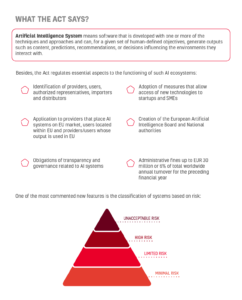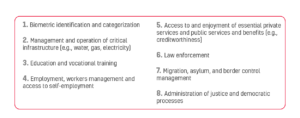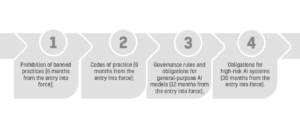Newsletter
March 21, 2024
European Union Artificial Intelligence Act is approved by the Parliament
On Wednesday (March 13th, 2024), the AI Act – European regulation that aims to lay down harmonized rules on artificial intelligence – was approved. This is one of the phases of the whole European Union’s project to “shape Europe’s digital future”, ensuring a fair and competitive digital economy.
The text of the law is considered innovative and will entry into force gradually. Now, the biggest challenge will be the implementation and enforcement by companies and business.

According to art. 6 (1), is considered a high-risk system (i) the AI system is intended to be used as a safety component of a product or is itself a product; and (ii) the product whose safety component is the AI system, or the AI system itself as a product, which is required to undergo a third-party conformity assessment.
Art. 6 (1) is subjective and can encompass several technologies, however Annex III (mentioned in art. 6 (2)) brings more specific hypotheses:

Brazilian AI Bill of Law
Just like the EU AI Act, US AI Blueprint, UK AI White Paper, and several AI regulations that are being built worldwide, Brazil has its own AI Bill of Law No. 2,338/2023, which aims to regulate AI in the whole territory.
Currently, the Brazilian AI Bill is under analysis of the National Congress and should have priority over other issues, according to a recent speech of Mr. Rodrigo Pacheco, president of the Federal Senate and reporter of the initial draft of the Bill.
Despite not being identical, the EU AI Act and the Brazilian AI Bill of Law have similar aspects:
– Risk based approach;
– Foster of development of AI systems and tools;
– Convergence with data protection and privacy regulations;
– Transparency and right of access should be granted to AI users;
– Possibility of human review after solely automated decisions;
– Importance of an impact assessment, audits and notification in case of incidents;
– Creation of responsible authorities, as well as application of sanctions (e.g., administrative fines based on criteria that can increase or decrease the amount discussed on the specific case).
Also, as a measure of bolstering innovation, both Brazilian and European Regulations created regulatory sandboxes, i.e., a controlled experimentation and testing environment in the development and pre-marketing phase.
In 2023, the Brazilian Data Protection Authority (ANPD) even opened a public consultation regarding the creation of such regulatory sandboxes for AI and data protection, since they will be an important tool for safe experiments of new technologies.
Practical Consequences and Next Steps
The approval of the EU AI Act was already expected by the whole world. Now, the text will go through a final linguistic review and will enter into force within 20 days of its publication. The AI Act will be fully applicable 2 years later, with some exceptions:

Companies that use AI systems in relation to EU will have to comply within the next months. This also impacts their operation in other countries of the world, for example in Brazil.
Generative AI is also an extremely important topic, since technology companies, content creators and right’s owners will have to balance the booster of innovation and the protection of Intellectual Property.
In addition, the spotlight created to the AI topic can also generate more comments and an advance on the Brazilian legislative discussions, in order to move forward with the Bill of Law No. 2,338/2023.
Our digital law team is following all the developments on this matter, as well as its impacts in Brazil and worldwide. If you would like to receive more information on the subject, please contact us at digital@kasznarleonardos.com.
Last related news
April 16, 2025
Medicinal Cannabis Review: Public Consultation 1.316/2025 open
The Public Consultation (CP) No. 1.316/2025, which aims to initiate the review process of Collegiate Board Resolution (RDC) No. 327/2019 from the … Medicinal Cannabis Review: Public Consultation 1.316/2025 open

April 15, 2025
Federal Senate approves Bill Extending Plant Variety Protection Term, but Chamber of Deputies Approval is Still Required
The Federal Senate has approved a bill (PLS nº 404/2018) that extends the protection period for new plant varieties (cultivars). According to … Federal Senate approves Bill Extending Plant Variety Protection Term, but Chamber of Deputies Approval is Still Required

April 15, 2025
Brazil Approves New Trade Reciprocity Law That May Impact Foreign Trademarks and Patents
Law No. 15,122, of April 11, 2025, authorizes Brazil to adopt retaliatory measures against countries that: (i) unilaterally apply or threaten to … Brazil Approves New Trade Reciprocity Law That May Impact Foreign Trademarks and Patents




